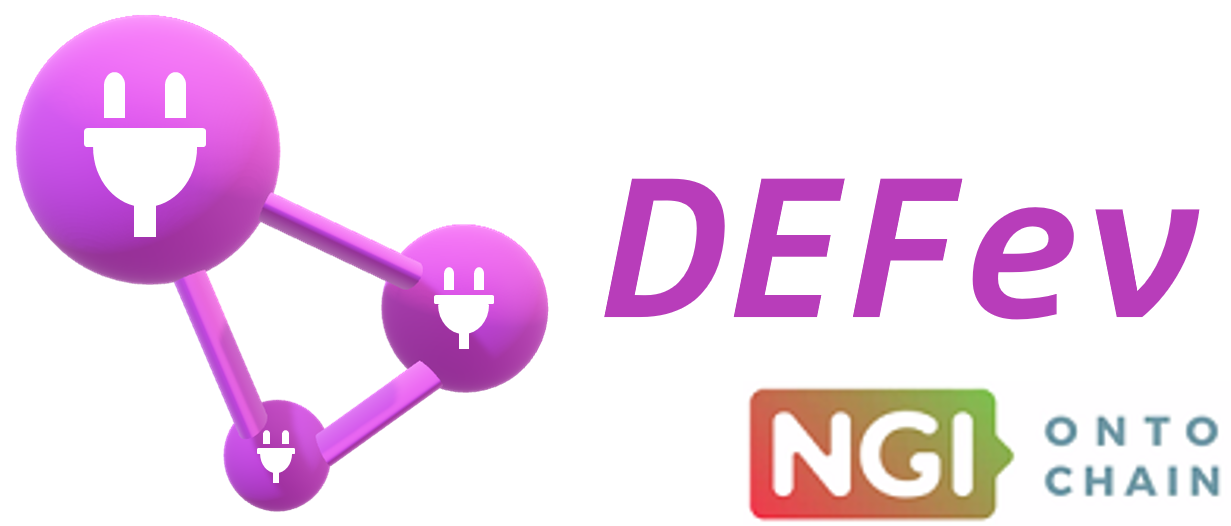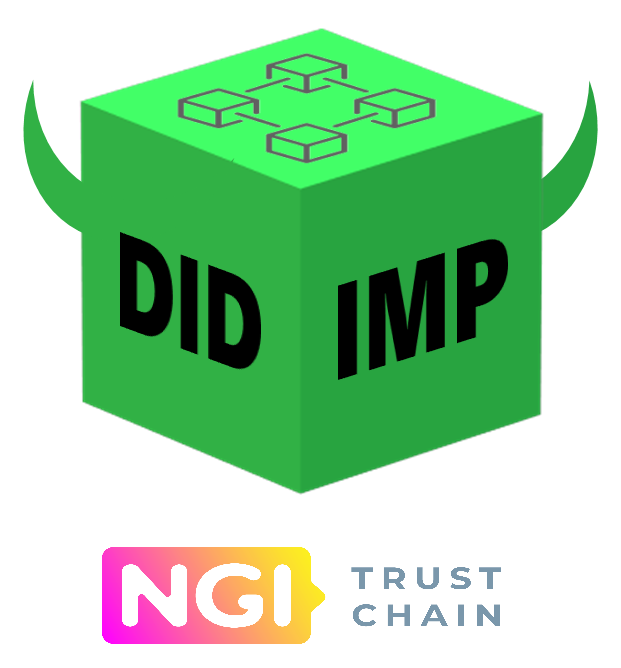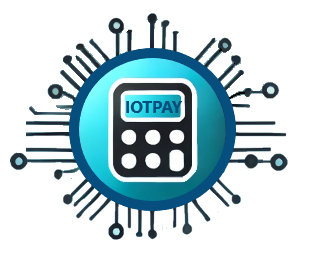Innovation Projects
Werenode is committed to advancing electric vehicle (EV) charging technologies by developing innovative solutions that leverage blockchain, IoT, decentralized identity, and cutting-edge user interfaces. This document highlights our key innovation projects: DEFev, DID-IMP, IOTPAY, and the Alexa Speech HMI version of Werenode, developed in collaboration with Renault's ElectroShaker Lab.
DEFev - Decentralized EV Charging Management
DEFev is a fully decentralized web application designed to provide a seamless user experience for managing EV charging using blockchain technology. DEFev aims to empower users with complete control over their EV charging transactions and data. DEFev was developed thanks to NGI Ontochain EU funded project (Grant Agreement Number 957338).
Key Features:
- Blockchain Payments: DEFev allows users to directly manage payments for charging using blockchain-based wallets, such as MetaMask. This ensures a secure and decentralized payment solution without intermediaries.
- Web3 Integration: DEFev leverages Web3.js to directly interact with the blockchain, enabling users to connect their wallets and interact with Werenode's smart contracts for EV charging.
- User Autonomy: The decentralized architecture means users have full control over their payments and transactions, with all interactions being transparent and recorded on the blockchain.
- Multi-Chain Support: DEFev supports both Tezos and Binance Smart Chain tokens—Werecoin (WRC) and BWRC, respectively—providing flexibility for users.
Collaboration:
DEFev was developed in the NGI Ontochain framework.
Benefits:
- Full Transparency: Transactions are recorded on-chain, ensuring full transparency for both charging station operators and EV drivers.
- Secure Payments: By using blockchain wallets like MetaMask, DEFev eliminates the risk of intermediaries, ensuring fast and secure transactions.
- Seamless User Experience: With the Plug&Charge feature, users can enjoy a simplified charging process, requiring minimal interaction to initiate a charging session.
DID-IMP - Decentralized Identity for Interoperable Mobility Platform
DID-IMP is Werenode’s Decentralized Identity project aimed at creating a secure and private way for users to authenticate and interact with the Werenode ecosystem. DID-IMP was developed thanks to NGI Trustchain EU funded project (Grant Agreement Number 101093274).
Key Features:
- Decentralized Identity (DID): DID-IMP leverages Decentralized Identity to allow users to authenticate across different platforms without relying on centralized authorities. This ensures data privacy and control over user credentials.
- Interoperability: The platform enables users to authenticate and use multiple EV services seamlessly, thanks to a decentralized and open identity protocol. This interoperability is a key step towards achieving a unified and user-friendly EV charging experience across different networks and service providers.
- Privacy-Preserving: DID-IMP ensures that users’ personal information is not stored on centralized servers, reducing the risk of data breaches. The decentralized architecture ensures that only the necessary information is shared in a secure and encrypted manner.
Collaboration:
DID-IMP was developed in the NGI Trustchain framework.
Benefits:
- Enhanced User Privacy: Users are in control of their own data, allowing for more secure and privacy-preserving interactions.
- Reduced Dependence on Central Authorities: With decentralized identities, users can move between different platforms and services without the need for multiple login credentials.
- Streamlined Charging Experience: DID-IMP allows users to access charging stations across the Werenode network and partner services without the need to create multiple accounts.
IOTPAY - IoT-Based Automatic Payment Solution - In Collaboration with Gapask
IOTPAY is Werenode's innovative payment solution that integrates Internet of Things (IoT) technology with blockchain to facilitate seamless and secure automatic payments. IOTPAY is developed thanks to NGI Sargasso EU funded project (Grant Agreement number 101092887).
Key Features:
- IoT Integration: IOTPAY enables the integration of IoT-connected devices, such as Shelly plugs and other smart charging points, to enable direct and automated payment processing.
- Blockchain-Based Payment Processing: Payments are executed using smart contracts on Tezos or Binance Smart Chain, ensuring secure and immutable transactions. This makes the payment process transparent and accessible to both users and IoT fleet operators.
- Real-Time Service Control: IOTPAY allows to initiate, pause, and stop service delivery using a connected device, with payment being processed in real time. This provides users with flexibility and complete control over their IoT devices.
Collaboration:
IOTPAY is developed in the NGI Sargasso framework.
Benefits:
- Automated Payments: Users can enjoy fully automated payments without needing to manually approve transactions for each service.
- Enhanced Security: By integrating IoT with blockchain, IOTPAY ensures that payment data is secure and cannot be tampered with.
- Low Transaction Costs: The use of blockchain allows for micro-transactions with significantly reduced costs compared to traditional payment gateways.
Alexa Speech HMI Version - In Collaboration with Renault's ElectroShaker Lab
Werenode has partnered with Renault's ElectroShaker Lab to develop an Alexa Speech HMI (Human-Machine Interface) version of the Werenode app. This collaboration aims to provide a hands-free, voice-activated solution for managing EV charging, making the experience more user-friendly and accessible.
Key Features:
- Alexa Voice Integration: This version integrates Amazon Alexa, allowing users to use voice commands to interact with the Werenode platform. Users can locate charging stations, initiate charging sessions, and monitor their progress using simple voice commands.
- User-Friendly HMI: The speech interface was designed to provide a highly accessible user experience. Users can easily manage their EV charging activities while on the go, without having to interact with a touchscreen or mobile app.
- Real-Time Information: Users can ask Alexa to provide real-time information, such as charging status, available charging stations nearby, and session costs.
Collaboration:
This project was developed in Collaboration with Renault's ElectroShaker Lab.
Benefits:
- Hands-Free Convenience: The Alexa Speech HMI allows users to manage charging without needing to physically interact with a mobile device, adding a layer of convenience and safety, especially while driving.
- Collaboration with Industry Leader: By collaborating with Renault's ElectroShaker Lab, Werenode is at the forefront of integrating automotive technology with voice-driven interfaces.
- Enhanced Accessibility: The speech interface makes the Werenode app more accessible to users who may prefer or need voice control, including individuals with disabilities.
DECO - Decentralized Energy COmmunities - In Collaboration with OP Mobility and SII
DECO (Decentralized Energy Communities) is an innovation project focused on creating decentralized systems to manage energy production and consumption at the community level. This project is a collaborative effort with partners such as OP Mobility, SII, and Werenode, combining expertise in energy management, data analysis, and blockchain technology. We also had key contributions from Geeps, Innowide and Gibsol.
Objectives:
- Decentralized Energy Management: DECO aims to manage decentralized energy communities that bring together prosumers and consumers on a local scale (e.g., within a two-kilometer radius). The community may consist of solar panels, battery storage, EV charging points, and more.
- Energy Optimization: Develop an energy transfer and optimization algorithm that leverages blockchain, IoT, and AI to optimize energy consumption and transfer within and between communities.
- Energy Management System (EMS): Each community member is equipped with an EMS that manages energy production and consumption, using IoT devices and connected batteries to store and optimize the usage of locally produced energy.
Key Components:
- Blockchain for Energy Traceability: The project uses blockchain to ensure traceability of energy production and consumption, allowing for transparent and auditable energy management.
- Energy Management System (EMS): The EMS includes smart meters, optional battery storage, and connection to an AI engine to provide energy optimization recommendations.
- Mobile App Integration: The existing Werenode mobile app will be extended to allow users to manage their energy usage, configure EMS settings, and track community energy data.
Collaboration:
DECO involves multiple partners:
- OP Mobility (formerly Plastic Omnium): Contributes battery expertise for energy storage solutions.
- SII: Provides expertise in data analysis, IoT, and AI to support energy optimization.
Benefits:
- Green Energy Optimization: By maximizing the use of locally generated renewable energy, DECO reduces electricity costs and minimizes carbon footprints.
- Community Resilience: The decentralized energy model enhances the community's energy independence, providing greater resilience against external disruptions.
Pitch:
LG WebOS TV Integration - Werenode App for Smart TVs
Werenode is consistently advancing the boundaries of electric vehicle (EV) charging technology by exploring innovative platforms to enhance accessibility. One of our notable projects is the integration of the Werenode app with LG's WebOS TV solution, designed to provide an unprecedented level of convenience in managing EV charging activities from the comfort of users' homes. Werenode has collaborated with LG to create a unique version of the Werenode app for LG’s WebOS TV platform. This integration enables users to manage EV charging sessions using their smart TV, making it easier and more intuitive for households to engage with and control their EV charging activities.
Objectives:
- Accessibility: Bring the Werenode EV charging ecosystem to a larger audience by making it accessible via LG Smart TVs.
- Enhanced User Interaction: Simplify the management of EV charging by integrating it into the daily household routine using a familiar interface.
- Wider Adoption of Smart Charging: Promote smart charging by leveraging LG's existing user base and WebOS platform.
Key Components:
- Werenode App for WebOS: A tailored version of the Werenode app is available for LG Smart TVs, providing a large-screen interface for managing EV charging.
- Seamless Integration with Existing Services: The TV app integrates with the Werenode ecosystem, enabling features such as locating charging stations, starting and monitoring charging sessions, and tracking energy usage.
- Interactive User Interface: Designed specifically for WebOS, the app provides a visually appealing and intuitive interface, optimized for use with a TV remote control.
Collaboration:
- LG Electronics: In preparation of the InnoFest 2023 in San Francisco, LG contributed their expertise in smart TV technology and WebOS to support out development of a customized Werenode experience for their users. This collaboration brought together Werenode’s expertise in EV charging with LG’s extensive consumer electronics reach, enabling a seamless integration.
Benefits:
- Convenient Charging Management: Users can now manage their EV charging needs directly from their living room, eliminating the need for a smartphone or computer. This makes charging management more convenient for the entire household.
- Enhanced User Experience: The large-screen format of an LG WebOS TV offers a better user experience and inclusivity, allowing users to easily locate charging stations, view charging details, and access energy consumption analytics.
- Promoting EV Awareness: Integrating the app into a widely-used household device encourages greater awareness and engagement with EV charging solutions, contributing to broader adoption of electric mobility.
- Family Collaboration: By integrating with the household TV, all family members can view and participate in managing the charging needs of shared vehicles.
Conclusion
Werenode is continuously pushing the boundaries of innovation in the EV charging ecosystem through projects like DEFev, DID-IMP, IOTPAY, DECO, LG WebOS and the Alexa Speech HMI in collaboration with Renault. These projects highlight our commitment to developing a fully decentralized, secure, and user-friendly environment for EV users, charging station operators, and automotive partners.
By leveraging blockchain, IoT, decentralized identity, and natural language interfaces, Werenode is making EV charging more efficient, accessible, and secure for everyone. Stay tuned for more exciting developments from our innovation pipeline!




